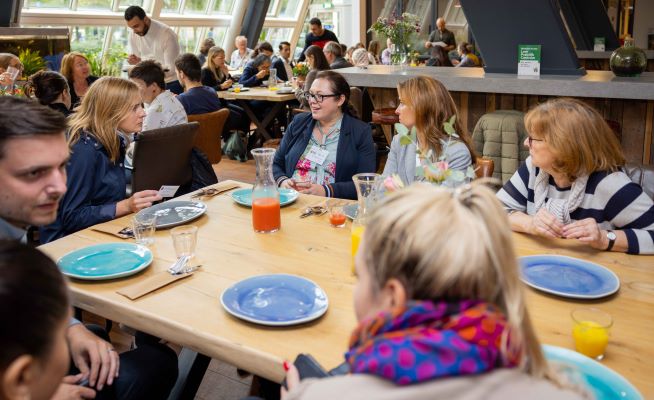Mentoring
Also known as: Coaching, peer-learning, twinning
Mentoring is an umbrella term for all forms of knowledge sharing where one or more experienced partners share information and inspiration with one or more learners. For example, in our EU-funded Sharing Cities project, a mentor, London, helped a mentee, Burgas, to improve its energy efficient street lighting.
Don’t let the apparent one-directionality fool you though: ‘weaker’ partners often help the strong ones by letting them see their practices anew and identify gaps and new ideas. Even so, this method can be contrasted with methods like communities of practice, where the emphasis is sharing knowledge on an equal footing.
Mentoring is usually a long-term activity, which can span a couple of months or a couple of years. It starts with Eurocities choosing a topic and finding mentor and mentee cities, some initial work introducing them to each other’s context, strengths and needs. Then comes organising a series of visits which can be to the mentor’s city (such as study visits and site visits) or to the mentee’s city (also called study visits or training).
Note that mentors don’t just show off their best practices, they also give examples of failures and hurdles they experienced on the way, which can help mentees avoid pitfalls on their journey.
Various terminology has been used to describe mentoring cities, including ‘lighthouse cities,’ ‘role-model cities,’ and ‘coach city.’ The same for mentee cities, including the terms ‘follower city,’ ‘fellow city,’ ‘replicator city,’ and ‘coachee.’
Method
- Theme and participant selection: Start by identifying overarching themes for the mentoring. Recognise that the specific learning requirements of mentees can vary, influenced by their unique contexts.
- Duration and structure: Typically, mentoring visits span two to three days. The agenda often comprises:
- Meetings with city officials, such as technical experts and decision-makers relevant to the theme.
- Site visits to pertinent locations (e.g. sustainably constructed schools, waste processing plants).
- Engagements with external stakeholders cooperating with the host city on the chosen theme.
- For an in-depth perspective on this, refer to the study visits methodology.
- Deeper understanding: The core of the mentoring visits is to foster a profound mutual comprehension of issues, local scenarios, and challenges. It’s an avenue to share and scrutinise new ideas, options, and solutions.
- Clear objective: Every visit should have a precise aim and anticipated outcome. This provides direction and ensures productive sessions
The sequence and number of visits are flexible, and organisers can tailor them to best suit their needs and objectives.
Examples of application
Eurocities’ EU-funded CREATE Project:
-
- Initially, participants engaged in work shadowing visits. This allowed them to acquire a hands-on grasp of each other’s cities before the mentoring commenced.
Eurocities’ EU-funded ROCK Project:
-
- The mentorship was structured across four sessions.
- First meeting (online): Introduction by the mentor of the project considered as best practice.
- Second meeting (online): Mentees articulated their specific needs.
- Third meeting (in-person): Mentees visited the mentors’ cities.
- Fourth meeting (in-person): Mentors journeyed to the mentees’ cities for a follow-up visit.
- The mentorship was structured across four sessions.
Eurocities’ AMIF-funded VALUES Project:
-
- Every visit culminated on the final day with the mentor and mentee jointly drafting an initial action plan. This detailed the subsequent steps to advance their objectives.
Top tips
Joint seeking
It is essential to foster a participative approach. Mentoring is not about imposing solutions but rather about jointly seeking and inspiring new
local approaches.
Guiding questions
The following guiding questions can be very useful to structure mentoring:
– What needs to change – where are the gaps and problems?
– What are the strengths the city or region can build on?
– What are the key goals to aim for?
– What practical steps or actions will help the city / region to reach these goals?
– What is the best and next practice most relevant to the city – based on experience across Europe and globally?
– What are the main threats and risks to handle?
– What are the key elements for replication/transferability?
– What are the key conditions for success?
Informal activities
Mentoring visits will typically include group activities like dinner, drinks or ice-breaking games that can help build trust and rapport between mentors and mentees and make communication easier and more effective.
Pros & cons
Pro
- Mentoring is a good method for supporting change at local level, especially on precise challenges.
- Mentoring enables cities to learn from their peers, often in a way that is more useful than having consultants or advisors who don’t have the experience of implementing this kind of practice.
- It also allows cities to get concrete, honest feedback about what to do and what to avoid.
- Mentoring lets you develop a network of contacts, both technical and political, in cities sharing the same challenges and objectives.
Con
- Sometimes, mentors are difficult to attract, as they wonder what’s in it for them. (Plenty, as it turns out! See ‘outcomes’ below).
Outcomes and impact
Mentoring transfers knowledge and experience between a mentor and mentee city through reflective approaches. It leads to better organisation, decision making, implementation or better vision and planning in mentee cities. It can focus on fine-tuning strategy, processes and/or specific policies or projects.
In particular, the mentoring visit is a chance to gather information and exchange ideas, to change attitudes locally, among a range of colleagues and stakeholders, and win their commitment to tackling the gaps or barriers which have been previously identified.
As well as mentees, mentors get a lot out of mentoring visits. First, these platform them as experts and advanced cities on the European stage. This has the added benefit that their model and concerns can contribute to any evidence, policy or guidance documents that are created during the process. In the case of EU-funded projects, the European Commission consults such documents when it is designing policy, so it’s a great avenue for your city to input at the highest levels of policy making.
Further, becoming a mentor is a good way for a given team or department within a city to gain prestige for themselves and their area of work within that city. When delegations from all over Europe fly over to learn about your city’s best practice in a given field, it can often heighten the regard of your peers in the local administration and among local politicians, and even nationally.
Another way that cities have reported that being mentors has affected local dynamics is that hosting visits has been an opportunity to meet and exchange with some of their own colleagues who they don’t usually have contact with, and has resulted in new internal collaborations and a stronger uniting vision.
Finally, seeing themselves and their practices through the eyes of a mentee has helped mentor cities gain new inspiration and improve their best practices even further. It can also lead to longer lasting collaboration, for example where the mentee has a strong example in another area of their work that the mentor can learn from.
Impact
In Sharing Cities, Burgas developed its own project for street lighting. One street, thanks to the smart lamposts, will become a free internet zone, with environmental sensors, video-surveillance, smart waste management of underground containers, spots for electric charging of mobile devices and wheelchairs, and an info-media-management system. The city took inspiration from Milan and Lisbon to install environment monitoring sensors and from London’s work to integrate e-vehicle charging (e.g. wheel chairs) points on the lampposts.
In Sharing Cities, Warsaw also took the example of the large scale deployment of charging stations for electric vehicles in Lisbon and how to manage the excess of demand for the grid; and Lisbon, inspired by the digital islands in Milan, decided to implement a similar solution.
Pitfalls
During the pandemic, when mentoring had to occur exclusively online and mentors and mentees did not meet in person, it was much harder to establish trust and understanding, and therefore to have frank and useful exchanges.
The application process for hosts and participants is crucial, as it can be challenging to find the perfect match.
The imbalanced dynamic that the term ‘mentoring’ implies can be misleading – it is important to remember and to emphasise that all cities in the process have something to gain from each other.
Links
For some examples of the mentoring process and results, see these infographics produced by our Asylum and Migration Fund funded ImpleMentoring project.
For detailed guidelines for mentoring from our ROCK project, see this document.
For detailed guidelines for mentoring from our ImpleMentoring project, see this document.


